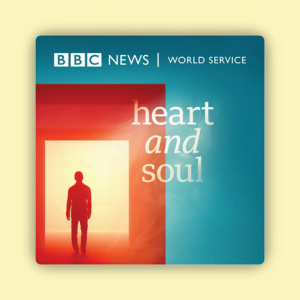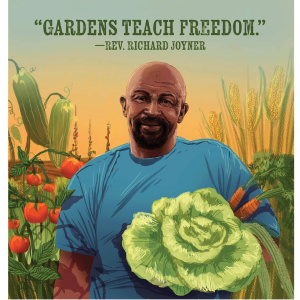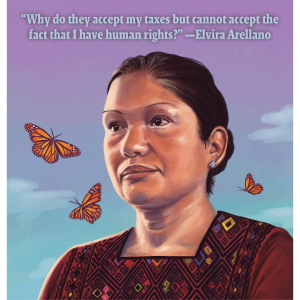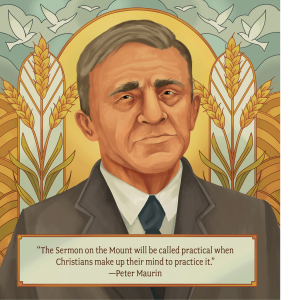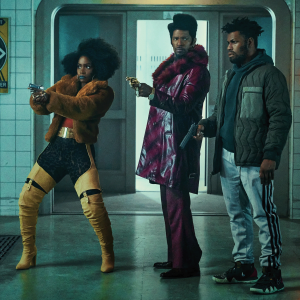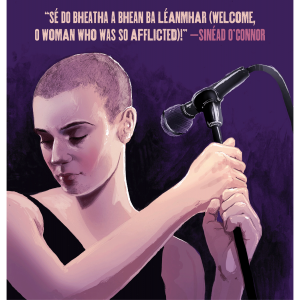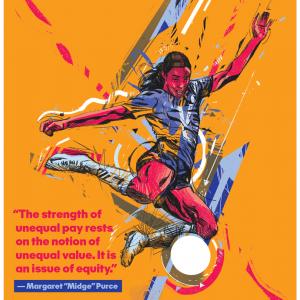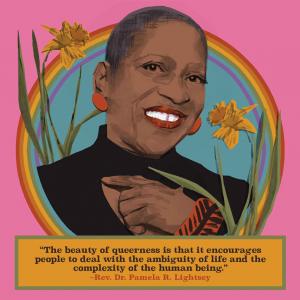Posts By This Author
New and Noteworthy: ‘Heart and Soul,’ Queering Contemplation, and More
Dispatches of Devotion
The BBC weekly podcast Heart and Soul dissects religion’s ubiquitous and misunderstood presence in public life. Imbued with a refreshing human sensitivity, weekly episodes cover a range of faith topics — from Russian Orthodoxy in Kenya to a Sikh music revival. BBC
Transcendent Visions and Deep Healing
ENGLISH MYSTIC JULIAN of Norwich had a busy 24 hours on May 13, 1373, during which she experienced a series of vivid and visceral visions. At a time when the church preached that suffering was God’s punishment on sinful people, Julian interrogated the crucified Christ: “Lord, how can all be well when great harm has come, by sin, to your creatures?” Jesus replies to her, “I am able to make all things well and I shall make all things well.” In this issue, reviewer Ezra Craker and columnist Sarah James draw on Julian’s wisdom for our own time.
New and Noteworthy: ‘The Empty Promises of White Supremacy,’ Building Better Healthcare Systems, and More
Class Over Race
In Trash: A Poor White Journey, chaplain Cedar Monroe explores the complex dynamics of being poor and white in the U.S. Grounded in liberation theology, the author ultimately calls communities to embrace multiracial solidarity and reject “the empty promises of white supremacy.” Broadleaf
Gratitude Amid Another U.S. Election Year
WELCOME TO ANOTHER U.S. election year. The man atop the Republican elephant charges forward. The incumbent astride the Democrat's donkey stubbornly digs in his heels. We at Sojourners seek to follow Jesus in his joyful mission of liberation for all. We see this in Georgia, through the holy imperfect work of racial reparations, as reported by assistant editor Josina Guess. We see it in California, where former Sojourners fellow Laurel Mathewson finds unexpected intimacy with God through prayer and study of Teresa of Ávila.
New and Noteworthy: A Primer on Activism, ‘Nice Churchy Patriarchy,’ and More
Bodies of Thought
In the podcast Weight For It, host Ronald Young Jr. explores “the nuanced thoughts of fat folks, and of all folks who think about their weight all the time.” These vulnerable, reflective episodes carefully address how fatness intersects with topics such as gender and health care. Radiotopia
What Lent, Valentine's Day, and Activists in Sports Have in Common
AT FIRST GLANCE, the congruence of Valentine’s Day and the beginning of Lent seems, well, incongruent. The first is culturally associated with hearts and chocolates, the latter with fasting and spiritual examination. But it turns out that the two have some deep overlays. The Feast of St. Valentine honors a third-century bishop who defied the Roman emperor and married young couples in secret, for which he was imprisoned and later executed, and for which he is remembered as the patron saint of love.
New and Noteworthy: Black Feminism, ‘That Tooth Nibbling at Your Soul,’ and Jamila Woods’ New Album
Poured Out
Singer-songwriter Jamila Woods draws on themes of spirituality and racial justice to create music at once urgent and transcendent. In her new album, Water Made Us, she sings, “Here comes the flood, I’ll save a place for you. / And when it’s all said and done / I hope you send a dove.” Jagjaguwar
Nonviolence Amid the Carnage of War
WE BEGIN PLANNING each issue of the magazine months in advance, and this edition was no exception. Our conversations about Christian nonviolence last summer were rooted in our long history of wrestling with questions of how to put our biblical faith into practice in the face of challenging, real-world problems. Our goal, as always, is to offer a word that is both “timeless and timely,” and the combination of John Dear’s biblical reflection on Mary’s role as a “teacher of nonviolence” and our interview with Palestinian peacemaker Ali Abu Awwad seemed exactly that.
New & Noteworthy: Artificial Wombs, ‘Authentic Unity,’ and More
Futuristic Dilemmas
In the film The Pod Generation, parents-to-be pay top dollar to gestate a fetus in an artificial womb outside the body, a commodification that more equally distributes the responsibility of pregnancy between males and females. But every technological advancement brings new moral quandaries. Scope Pictures
The Power of Rest in a Time of Violence
As we go to press, violence again erupts in the Holy Land. In the season of Advent, we prepare for the birth of the Prince of Peace in a rough shelter in a Palestinian village and hear again God’s ancient promises first given to the Hebrew people. But all is not calm in Bethlehem, Jerusalem, Gaza, or Ashkelon. The agitations of injustice and fear have turned a season of dreams into one of nightmares.
New & Noteworthy: Horror in the Bible, ‘They Cloned Tyrone,’ and More
A Sci-Fi Dark Comedy
They Cloned Tyrone is both hilarious and harrowing in its depiction of a drug dealer, sex worker, and pimp who suspect the U.S. government is experimenting on their community. The film shows how, too often, Black people must choose between assimilation or annihilation. Netflix
Echoing God's Economy of Generosity
For a decade or so, beginning in the 1970s, members of the intentional Christian community that founded Sojourners magazine practiced a form of economic sharing we called the “common pot” — all our income was pooled for the good of the whole community. In doing so, we sought to model ourselves after the practices of the early Christian church, the first followers of Jesus, as described in Acts 2 and 4 — “All who believed were together and had all things in common” (Acts 2:44); “Now the whole group of those who believed were of one heart and soul, and no one claimed private ownership of any possessions, but everything they owned was held in common” (Acts 4:32).
Can Churches Be Healers of Church-Rooted Trauma?
FOR MATTHIAS ROBERTS, and many others, growing up in the church was a traumatic experience. His childhood churches, he writes in our cover feature, were “filled with people who weren’t afraid to tell me I needed to become straight for God to save me from hell.” The effect of such “adverse religious experiences,” as Roberts explains, goes far beyond the immediate harm done to individuals in these settings and can linger deep into their adult lives. That trauma can be triggered by any church experience, even in a supposedly safe and affirming context — another reminder that what happens in any branch of the body of Christ affects the integrity and witness of the whole of the church.
Journalist Gabriel Pietrorazio writes about another kind of church-related trauma, that stemming from what Pope Francis called the “cultural destruction and forced assimilation” of residential schools, often church-run, that many Indigenous people in the U.S. and Canada were made to attend. While there isn’t a clear or easy map to healing for the survivors of religious trauma, one necessary component is the presence of a loving, compassionate community — it’s not a journey to be undertaken alone.
New & Noteworthy: Ancestral History, ‘The Secrets of Hillsong,’ and More
Beyond the Scandal
The Secrets of Hillsong draws on the reporting that exposed misconduct at the Hillsong megachurch. The docuseries goes beyond the headline scandals to explore patterns of abuse engrained in Hillsong’s history and asks what rebuilding looks like in the aftermath of scandal.
Hulu
New & Noteworthy: ‘BlackBerry,’ Overlooked Christians, and More
Capitalist Cautionary Tale
BlackBerry highlights the role of greed in capitalism through the story of the rise of the BlackBerry smartphone. The film, which transports us to a time when smartphones weren’t omnipresent fixtures in our lives, shows the danger of valuing innovation more than ethics.
Elevation Pictures
Taking On the Money Changers
CHRISTIAN DISCIPLESHIP is inherently about choosing sides. Yes, some might harbor a temptation to take the supposedly safer path of remaining “neutral,” but that's a delusion: Such alleged neutrality always favors the status quo. To paraphrase Edmund Burke, if good people don't choose sides, the “side” with power and wealth will always win. Or as Lutheran pastor Korla Masters puts it in this issue, “Jesus invites ... us to whole lives of asking ourselves which side we are on and whole lives of answering that our entire selves belong to the kingdom of heaven.”
Real Progress Requires a Prophetic Perception
MANY SCRIPTURAL METAPHORS for transformation involve variations on the “open my eyes that I may see” plea of Psalm 119; the writer of Ephesians 1, for instance, prays for the enlightenment of the “eyes of your heart” so that “you may know the hope to which he has called you.” Various authors in this issue wrestle with similar images. For example, our Prelude, which draws on the writings of French Jesuit Pierre Teilhard de Chardin, refers to the “worst failing of our minds” as the inability “to see the really big problems” that “are right under our eyes.”
Much of our culture, Zachary Lee explains in his cover feature on Hollywood “spectacle,” serves to distract us from those “really big problems” and makes it difficult for us to see in different, more hopeful ways. Bible savant Walter Brueggemann, who knows a thing or two about alternative ways of perceiving, said that prophets “are able to imagine the world other than the way that is in front of them.” But that task, that “prophetic imagination” of seeing with enlightened eyes, isn’t reserved just for prophets: It’s really an invitation to all of us who seek a better world.
New & Noteworthy: Sinéad O’Connor, ‘Tell Her Story,’ and More
The Sinéad Effect
Nothing Compares documents the tumultuous career of Irish musician Sinéad O’Connor. On live TV in 1992, O’Connor protested child abuse in the Catholic Church, nearly a decade before papal acknowledgment. Her actions jeopardized her career, but she clung to music as a form of healing.
Showtime
New & Noteworthy: Superhero Theology, ‘Extrapolations,’ and More
New Earth?
The TV show Extrapolations, featuring Meryl Streep and Forest Whitaker, offers eight terrifying visions of how climate-changed humanity’s unchecked consumption will harm Earth. The interwoven stories aim to inspire climate action, even as they disturb.
Apple TV+
Pop Culture Can Shape Our Reality
POPULAR CULTURE PLAYS an important role in shaping our view of the possible. Ta-Nehisi Coates, author of Between the World and Me, for years wrote Marvel’s Black Panther and Captain America comics. “I think we don’t always realize the extent to which the culture actually interacts with politics,” Coates said on Ezra Klein’s podcast. “I could advocate for all of the policies in the world ... but it really, really occurred to me that there’s a generation that is being formed right now that’s deciding what they will allow to be possible, what they will be capable of imagining. And the root of that isn’t necessarily the kind of journalism that I love that I was doing, the root of that is the stories we tell.”
In this issue, sojo.net associate news editor Mitchell Atencio looks at some of those stories — in particular, superhero comics — and explores what is not being told, and how pop culture often avoids grappling with the way our country approaches issues such as policing and incarceration. That failure has consequences far beyond the DC and Marvel universes.
